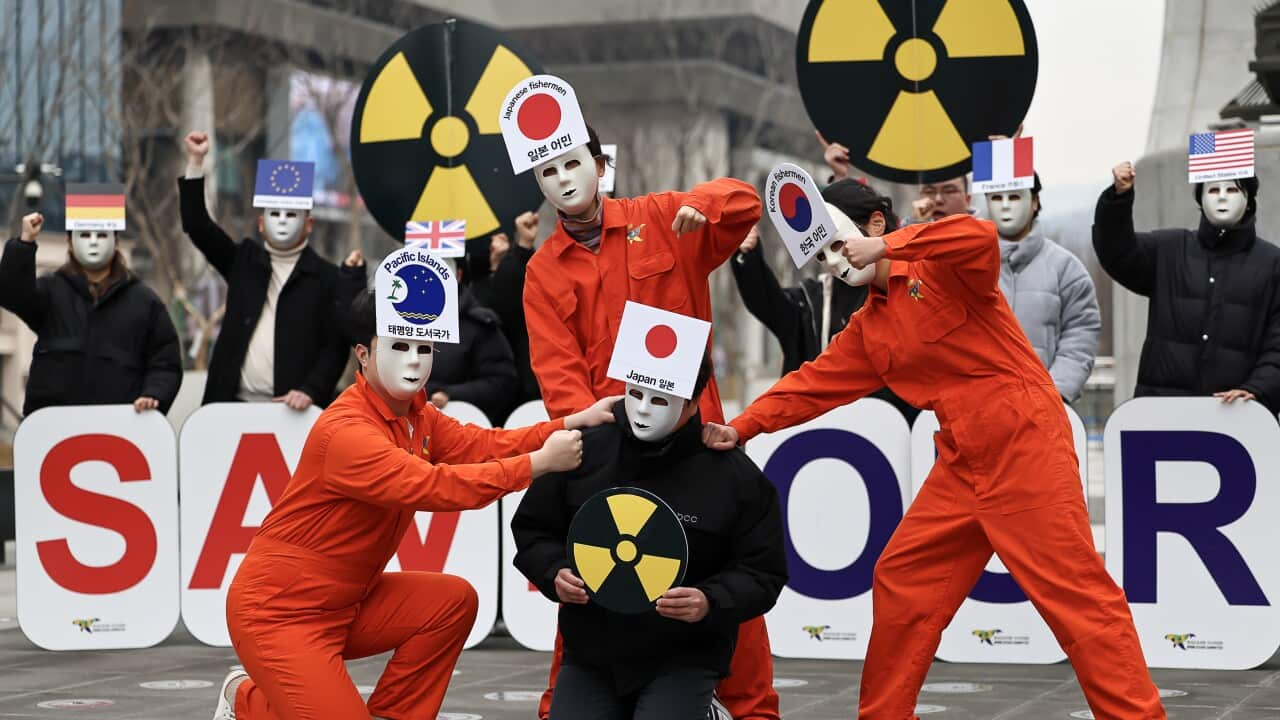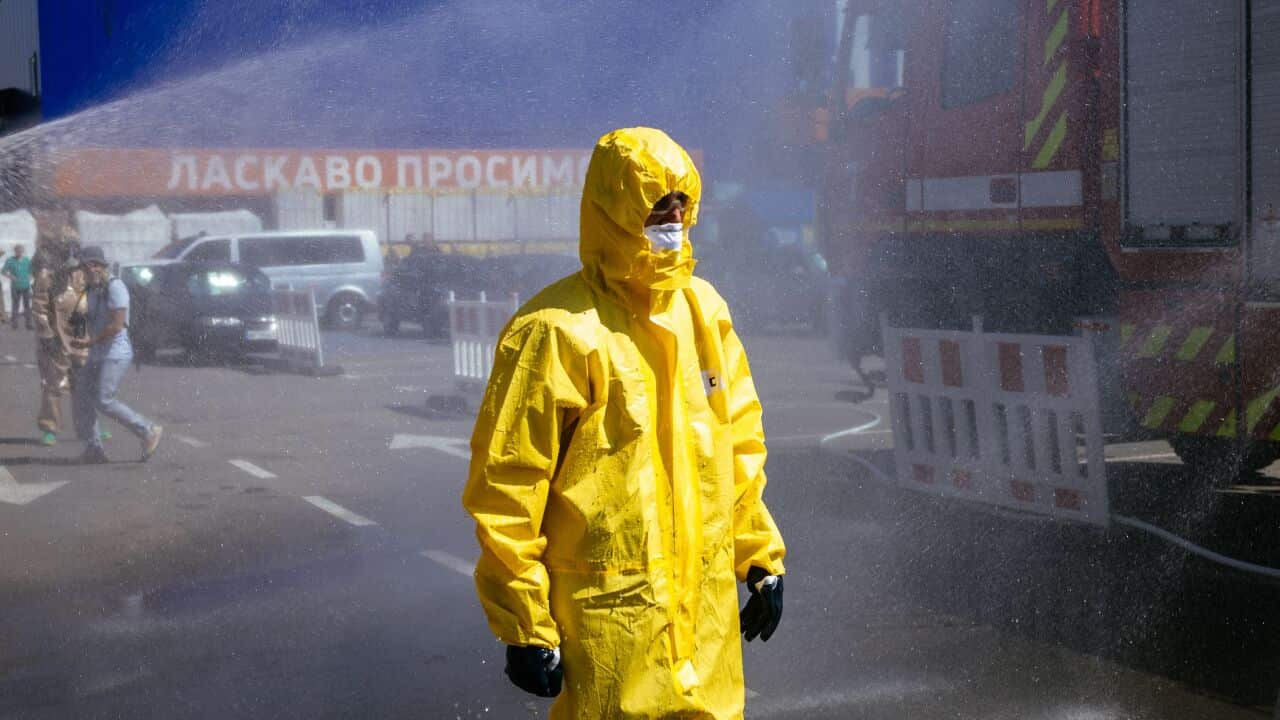Japan plans to dump water containing Fukushima nuclear waste into the ocean. Is it safe?
Some of Japan's neighbours remain skeptical of the plan despite claims that the water to be released into the ocean is "tap water".

Environmental activists in the South Korean capital Seoul give a performance calling on Japan to reverse its decision to release radioactive water from the Fukushima nuclear power station into the ocean. Source: AAP / Yonhap/EPA
KEY POINTSJapan will release one million tonnes of lightly contaminated water into the Pacific Ocean.
The water was used to cool reactors at the crippled Fukushima nuclear power plant.
The scientific community is divided on the issue.
Water containing tiny amounts of nuclear waste from Japan's Fukushima nuclear power plant will be released into the Pacific Ocean in the coming months after Japan's government deemed it safe to do so.
On 11 March 2011, a magnitude 9.0 earthquake struck off the coast of northeastern Japan, triggering a tsunami with waves as high as 38 metres.
The tsunami caused a major accident at the Fukushima power plant further south, where water flooded the reactors, sparking a radiation leak and forcing the evacuation of tens of thousands of people.
Advertisement
Politicians in nearby South Korea have come out strongly against the decision to let the water flow into the ocean, even though the country has engaged in the practice in the past.

A total of 1,000 tanks have been used to store treated radioactive water after it was used to cool down melted fuel at the Fukushima Daiichi Nuclear Power Plant, run by Tokyo Electric Power Company Holdings. Source: AAP / Hiro Komae/APThe scientific community appears divided over the issue, with some saying the decision is completely safe while others, such as University of Adelaide Associate Professor Tony Hooker, an expert in the health effects of radiation, have termed it "controversial".
He said the plan was "robust", but "there is a growing question regarding the use of the sea as a dumping ground when our oceans are already stressed and struggling".
Why is the Japanese government releasing the waste?
The government is expected to release the waste once it receives a report from a Korean technical expert group that visited at the end of last month.
The water has been used to cool the melted reactor of the Fukushima Daiichi Nuclear Power Plant, but after filling more than 1,000 tanks, storage is expected to reach capacity in early 2024.
After extensive dilution processes, there is only a minuscule amount of radioactive energy in the water.
The government is moving very slowly and cautiously on this, Curtin University physics professor Nigel Marks told SBS News.
Their approach has been verified by reports from the global regulating body Independent Atomic Energy Agency.
LISTEN TO
'I never want to feel that powerless again': Japan's devastating 2011 earthquake and tsunami remembered
29:18
PLAYThe body has assessed the Japanese regulatory system, safety review missions, corroboration of the independent sampling, data and analysis, and inter-laboratory comparisons.
But Robert Richmond, a member of the Scientific Advisory Panel to the Pacific Islands Forum, said the plan is "premature and presently, ill-advised".
He argues the environmental impact assessments were inadequate and deficient.
READ MORE

A decade after Fukushima, towns in Japan struggle to rebuild community
"The peoples of the Pacific did not contribute to the present problems and have nothing to gain from Japan's plan for the contaminated water release over the next thirty plus years, but have much at risk for generations to come," Mr Richmond said in a statement.
Once storage for the water runs out, the only other options are to release it into the ocean or evaporate it into the atmosphere.
The Pacific Island Forum Scientific Panel has proposed to use the wastewater to make concrete, but Professor Marks said the radioactivity in the water would eventually be released into the atmosphere through this process anyway.
Is the proposal safe?
The main radioactive chemical authorities are concerned about is a type of hydrogen called tritium, which is produced as a by-product in nuclear reactors, such as the one at Fukushima.
But releasing the water is extremely safe, given the extremely low amount of tritium in the water, which is basically "tap water", Professor Marks said.
"There's natural tritium in the waters around us, so even the water that you and I drink contains some tritium that's been created from afar," he said.
"So the Pacific Ocean contains about 8,400 grams worth of tritium at the moment. At Fukushima, across all of the tanks, they've got about three grams worth of tritium."
READ MORE

Zaporizhzhia's 'last working' nuclear reactor loses power after Russian shelling
Professor Marks said water containing tritium would eventually flow to Australia, but it would barely be detectable, let alone problematic.
"Even the fish that live directly where the water comes out, even they will be thousands of times below the level at which anything harmful would happen," he said.
Tritium also forms naturally in small amounts when cosmic rays hit the earth's atmosphere, with the tritium falling into the oceans.
Honorary Associate Professor at the Australian National University, Tony Irwin, is an expert on nuclear reactors. He said the water discharge would not be without precedent.
He said: "Nuclear power plants worldwide have routinely discharged water containing tritium for over 60 years without harm to people or the environment, most at higher levels." (than what's planned for Fukushima).
“For comparison, in South Korea, the Kori plant discharged more than four times the planned Fukushima discharge. Provided the levels of all dangerous radioisotopes are below regulatory levels, the planned discharge at Fukushima is very conservative."

Environmental activists at a protest rally calling for the government to abandon policies for promoting nuclear power generation in Seoul. Source: EPA / Jeon Heon-Kyun
Why has there been strong opposition to the idea?
Regular protests have been held in Japan and South Korea over the issue.
Some South Koreans have been buying salt and seafood in bulk as they fear their food and oceans will soon be contaminated.
But this position is entirely political and "totally overblown", Professor Marks said.
Some Pacific Islands nations have also expressed concern, but Palau President Surangel Whipps Jr has recently changed his position and is now supporting the decision.
Earlier in May, Solomon Islands reportedly cited the nuclear waste issue as a reason to rebuke an offer from Japan to step up maritime cooperation.
No comments:
Post a Comment